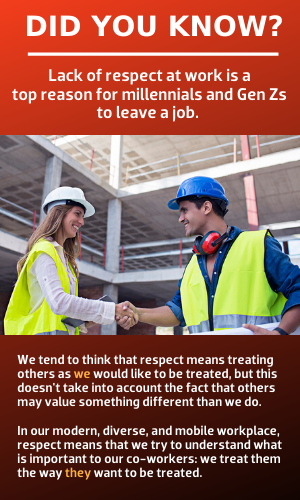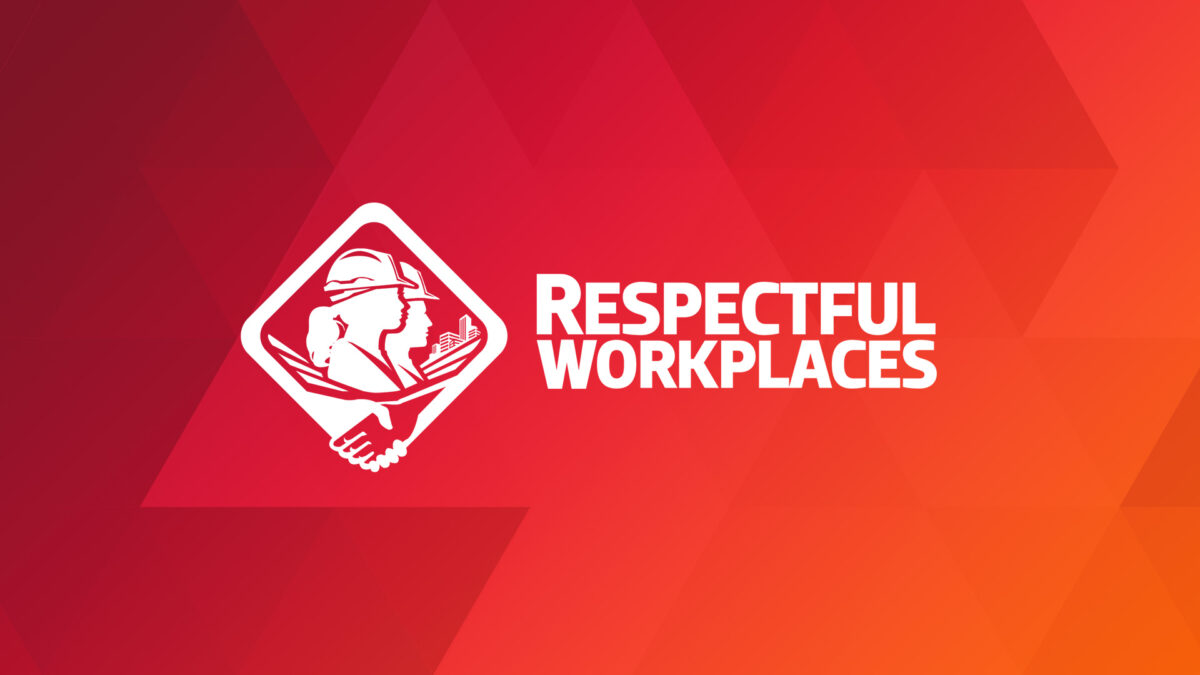Does your organization understand the meaning of respect?

In the Deloitte Millennial Study 2019, millennial and Gen Z (iGen) workers reported that not feeling appreciated and not liking their workplace culture were top reasons for their intentions to leave their organizations in the near term.
In 2020, millennial workers will make up about half of the workforce and Gen Z workers will represent about 36% of the workforce, so the importance of respect at work should be a strategic priority.
Respect, however, is often not well understood, even when an organization claims that “respect” is one of its core values. Here are some examples of core value statements: “We build diverse and respectful partnerships,” “Our core values build respect,” and “Connecting with dignity and respect.” Yet none of these statements define “respect.”
We tend to think that respect means treating others as we would like to be treated, often referred to as “the golden rule.” But this doesn’t take into account the fact that others may value something different than we do. For example, what you may find funny, others may find offensive.
In our modern, diverse, and mobile workplace, respect means that we try to understand what is important to our co-workers: we take into consideration their rights and feelings and treat them accordingly. This approach is called the “platinum rule:” we treat others the way they want to be treated.
This means that each of us takes responsibility for treating others with respect. When we say or do something that offends or hurts the feelings of someone else, we can brush it off by believing that if we didn’t intend to offend, we aren’t responsible for the effect on that person.
Workers often wonder whether a joke is considered as harassment if they didn’t intend to offend co-workers. Generally, words and actions need to be repeated and constitute “a course of conduct” in order to be considered as discrimination or harassment. However, words or actions not intended to cause anxiety or offence, can be a violation of respect because of the effect on others.
This understanding is supported by human rights laws, which consider the effect of words and actions, and policies and programs on people with different genders, backgrounds, and circumstances. A policy or program that has the effect of excluding an individual or group of individuals based on certain characteristics is discriminatory even if discrimination was not intended. This is known as systemic discrimination.
In order for an organization to be respectful, respect must be a core value, and as such provides the foundation for determining whether an action or policy or program is respectful. The core value must be clearly stated and provide the framework for every other policy and program. Research shows that for a policy to be effective it must be clearly tied to an organization’s core values. People are more motivated to support a policy when they understand the purpose behind it.
Here are some examples of what respect looks like as a core value. In our conversations we listen first; when we disagree, we do so in such a way that doesn’t belittle the other person. This applies to social media. It also means that we listen patiently to people we find difficult to understand because they speak with an accent. We recognize that some jokes might offend some people, so we don’t tell them. We don’t gossip or spread rumors about others.
Respect as a core value also directs employers’ decisions. In a respectful workplace, employers take into consideration the rights and feelings of their workers. It means that employers ensure their onboarding process is well thought out. They train all workers on how to resolve conflict in constructive ways. It also means that violations of respect, such as policies and programs that have the effect of excluding LGBTQ people from recruitment, for example, are revised to ensure that those individuals have equal opportunities.
Recognizing that we are responsible for the effect of our words and actions enables inclusion in the workplace. When we consider and appreciate differences in our co-workers, we are creating a welcome and inclusive workplace. This understanding of respect is a powerful tool for creating and sustaining the “inclusive” part of a respectful and inclusive workplace.
The BuildForce Respectful and Inclusive Workplace Toolkit may be useful in assisting your organization in creating a respectful and inclusive workplace. Organizations might consider using the “Working in a Respectful and Inclusive Workplace” online course to help supervisors and workers understand why the effect of their words and actions is important. The course helps learners to recognize the signs of a respectful and inclusive workplace and how they can be part of the solution.
For more info:
- Alessandra, Tony and Michael J. O’Connor. “The Platinum Rule.” 1996. Warner Books, New York.
- Deloitte. The Deloitte Millennial Survey 2019. See www2.deloitte.com/global/en/pages/about-deloitte/articles/millennialsurvey.html
Read from the beginning. Click here to start at Part 1.
What can an effective Respectful and Inclusive Workplace Program deliver?
- Become an employer of choice – attract, retain, and advance top talent from all sources of labour
- Unlock collaboration and innovation – create high-performing teams through diversity of thought and experience
- Build your brand – your organization will gain a competitive edge as a leader and innovator
Get started today!
The BuildForce Canada Online Respectful and Inclusive Workplace Toolkit includes:
- the Respectful Workplace Online Self-Assessment Tool to assist organization leadership in assessing their current situation and identifying where they may need to make changes
- the Respectful Workplace Policy Framework and Implementation Guide to assist organizations in creating and implementing a policy that supports a respectful and inclusive workplace
- the Respectful Workplace Online Training Course to train workers on how to create and support a respectful and inclusive workplace
- the online course Introduction to Understanding Systemic Racism: A Guide for Leaders and Managers
All the resources you need to create and support a respectful and inclusive workplace!

Respectful and Inclusive Workplaces
